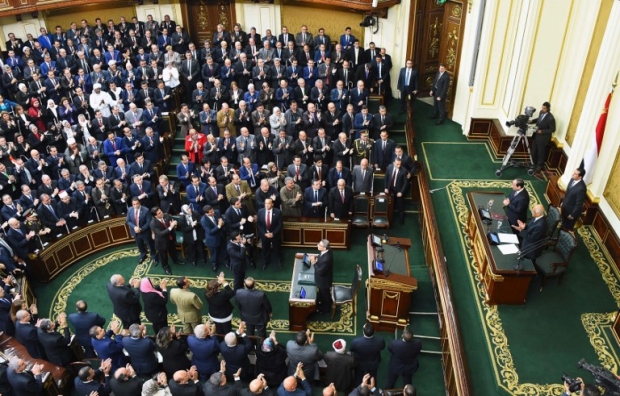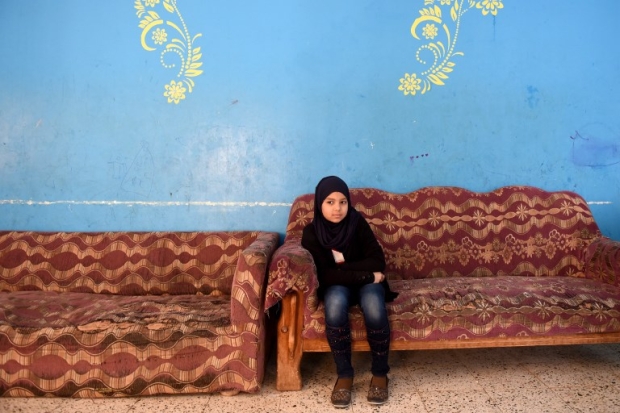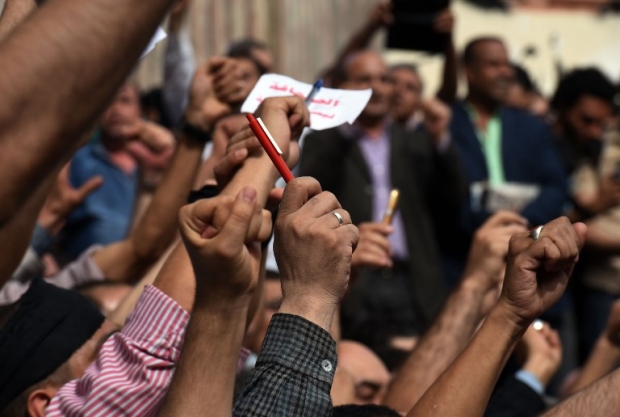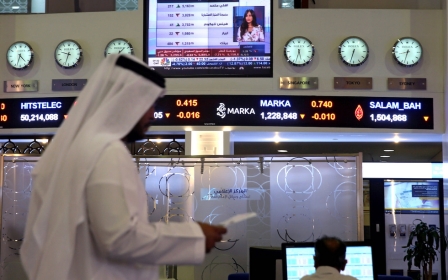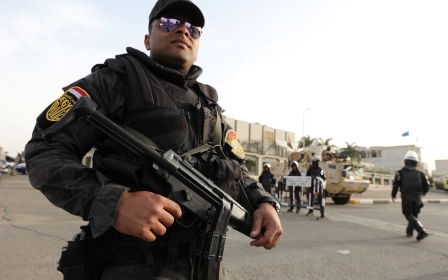Sisi tightens the noose
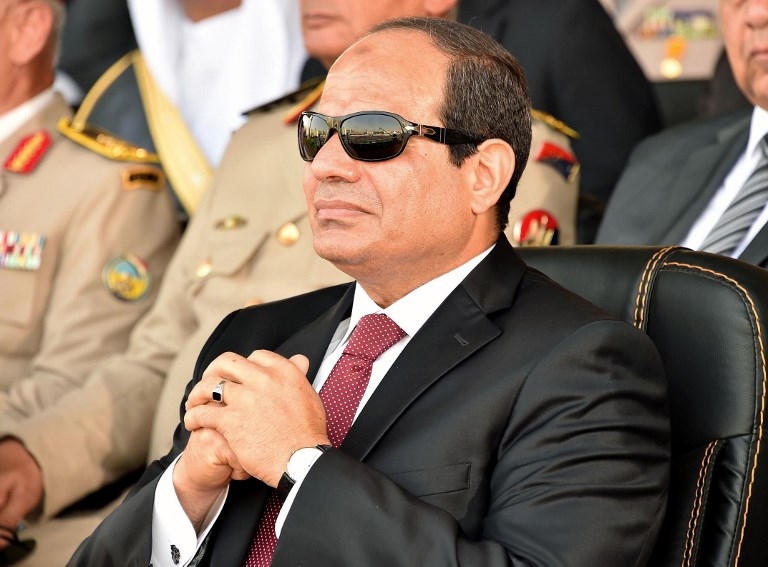
It is entirely possible Abdel Fattah al-Sisi has never heard of Louis XIV. He nevertheless embodies, with verve, the words attributed to the Sun King: “L’etat c’est moi” – I am the state. Men with a passionate belief in orders, structure and security as a fast track to absolute power are no lovers of democracy.
To be clear, while his predecessor’s rule was anything but a democracy, Sisi did not come to fix this. Where Mohamed Morsi bumbled Sisi rumbles: this is a man with a laser focus on the end goal, building an Egyptian society well-oiled by the dictatorial machinations of foreign and domestic elites over many decades.
Will Sisi's tightening of the noose on all opposition strangle him in the process?
A neo-modern state run like an empire has been the Sisi blueprint all along - even if among those calling the shots in the Egyptian army, few predicted it. Instead, in Sisi, they saw a man who could roll back the naive and disorganised – albeit legitimate - dreams of a nation and deliver a bigger slice of the pie.
What those men failed to imagine was that Sisi would rewrite the dictator workbook with such cold blood. Those in the opposition who believe that Sisi is a simpleton who uses kilos of muscle and grams of strategy are naive.
Sisi, in delivering a hail of bullets in recent weeks to Egyptian NGOs and obliterating all journalism that dares to be contrarian, is a surprising force on the burgeoning International Dictator Team.
But will the tightening of the noose on all opposition strangle him in the process?
Legal repression
While the eyes of millions in the Middle East are drawn, as moths to a flame, to the Machiavellian moves of Saudi Arabia, the United Arab Emirates, and Egypt against Qatar, Sisi has continued, undeterred, in an effort to secure the remaining real estate in Egypt’s power structure.
This is a man who understands optics and uses a charade parliament manipulating the common folk with the silliest of lies. And all of this is happening within the bounds of the Egyptian law and its constitution.
The state no longer needs to murder thousands. Now Sisi seeks the legitimacy of law with healthy dollops of the veneer of diplomacy
You see, the state no longer needs to murder thousands. Now Sisi seeks the legitimacy of law with healthy dollops of the veneer of diplomacy to deflate dreams of a democratic society. He has made it plain that his voice - and his voice alone - is the one Egyptians should listen to.
As simple as it is incendiary, his plan is to scuttle independent journalism and shut down NGOs which disturb the monolithic state narrative.
The new NGO law is even more damaging than the brutal protest law of November 2013 which pulverised public protest, the epicentre of the 2011 revolution, and “legalised authoritarianism”.
This new law – which Amnesty International has described as an effort to “annihilate human rights groups” - seeks to curb the efforts of Egyptians and those who support them from stepping outside the carefully drawn boundaries of the security state.
“It’s not just human rights organisations,” explained Mohamed Zaree, an Egyptian human rights defender who is facing charges of threatening national security.
Bluntly, this authoritarian edict is a knife to the throat of Egypt’s 47,000 local NGOs and around 100 that receive foreign financing.
They must abide by the terms of law within one year – including refraining from rights work or anything that could “harm national security”, paying $16,500 to start up operations, re-registering with the state - or face up to five years in prison and $55,000 in fines.
Do as we do or we will do unto you is this regime’s national anthem.
Keep them poor
Long before Sisi, Egyptian autocrats sought over decades to dilute and limit the effects of civil society at large, specifically rights groups.
Many may understand that the main purpose of this draconian law is to control both the purse strings and the agendas of local and foreign-funded Egyptian NGOs.
Many may understand that the main purpose of this law is to control the purse strings and agendas of NGOs. The objective is even more sinister
And surely, when it comes to foreign funding for local NGOs, the law makes its nefarious intent explicit and its hyper-nationalistic motivation as loud as a histrionic Sisi laugh: should any organisation accept foreign funding, without being vetted by a new “National Authority for Regulating International NGOs”, penalties are punishing: 1 million EGP ($55,000) and criminal penalties up to life imprisonment.
But the objective is even more sinister.
Picture this - and I witnessed it myself: a pious, sincere thirtysomething Egyptian woman – who gets no reward of her own for her efforts - has been forced to make secret a Facebook group which she uses only to match up donors from her personal circles with Egyptians who are truly in need. Without this prohibitive law, her calls for funds would have been all over social media and likely more successful and able to help those in dire need.
To maintain political control, this government is more than happy to keep Egyptians poor or make them poorer.
Some may have thought that Fayza Abou al-Naga - the politician who caused a big stir in 2012 between the US and Egypt during the infamous NGO trial and was used by multiple Egyptian regimes to hit the West below its human rights belt - was the epitome of Egyptian political cynicism. But the NGO law takes us to nether waters unvisited by logic and justice.
Third party censorship
Even with the Red Sea Islands fiasco set to explode again as Sisi’s putty parliament wraps a noose around it - or perhaps because of such an impending crisis - Sisi has put journalism in his cross hairs.
Chaining the press to the wall has long been one of the goals of the counter-revolution, but with one disastrous move after another, it now behooves the strongman to get on with it.
By blocking more than 21 media sites, as he did just a week before the passage of the NGO law, Sisi pounded those he believes are after him. From Mada Masr and Daily News Egypt, both of whom I have had the honour to write for, to Al Jazeera, media organisations from across the political spectrum were hit.
They had no notification, written or otherwise, just a sudden and deadly blow from a third party using the same type of technology that China uses to block websites.
Why did these sites get blocked? Naturally, this depends on who you ask. MENA, the official government news agency, claimed they were “spreading lies” and “supporting terrorism”. But from this vantage point, it seems the only terrorism emboldened here is that of the state.
Hide and seek
States cannot and should not, under any guise or circumstance, be allowed to arbitrarily label free speech as “lies and terrorism”. Remain silent now and the regime can and will silence readers next.
By cracking down on the media and injecting daily dosages of fear through arrests, torture and extrajudicial murder, Sisi has tried to hit the mute button on society, paving the way for more of the same a year ahead of the so-called 2018 elections.
In recent conversations with sources and experts, another question keeps popping up: is Sisi attempting to trigger a massive confrontation with those he believes to be his enemies?
When a regime seeks to silence any voice, reader and citizen alike must pose the question: what are you hiding?
At first, this idea seems insane. This is a man who has been losing support consistently for more than half of his tenure. But first blushes are not necessarily telling.
By pressing ahead, tightening the noose on discourse in politics, the judiciary, the press and civil society as never before, Sisi forces a subterranean opposition to peek out of its holes. Without a doubt, he has a guillotine ready.
Regardless of his motivations, this much is certain: Sisi’s default setting is the hammer over the feather. Never will he be known as Abdel Fattah Subtle al-Sisi. This two-pronged attack on NGOs and the press is yet more proof of his merciless character.
But make no mistake. There is a method to this man’s madness and, left unchecked, the noose will tighten around all sides - including him.
- Amr Khalifa is a freelance journalist and analyst recently published in Ahram Online, Mada Masr, The New Arab, Muftah and Daily News Egypt. You can follow him on Twitter@cairo67unedited.
The views expressed in this article belong to the author and do not necessarily reflect the editorial policy of Middle East Eye.
Photo: Egyptian President Abdel Fattah al-Sisi attending a military academy graduation on 30 July 2015 (AFP/Office of the Egyptian Presidency)
Middle East Eye propose une couverture et une analyse indépendantes et incomparables du Moyen-Orient, de l’Afrique du Nord et d’autres régions du monde. Pour en savoir plus sur la reprise de ce contenu et les frais qui s’appliquent, veuillez remplir ce formulaire [en anglais]. Pour en savoir plus sur MEE, cliquez ici [en anglais].



